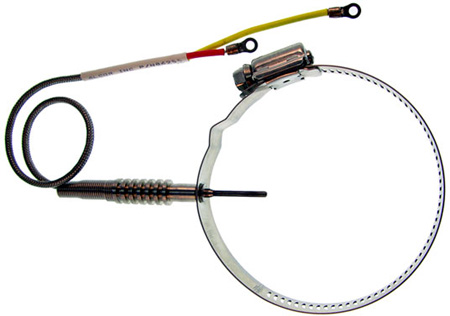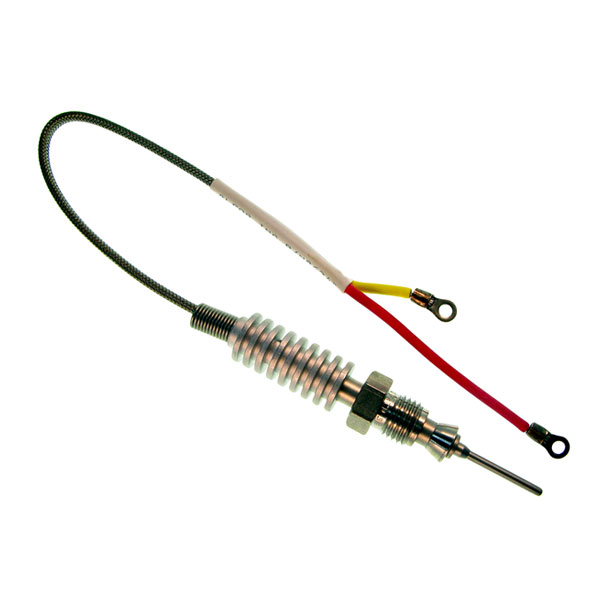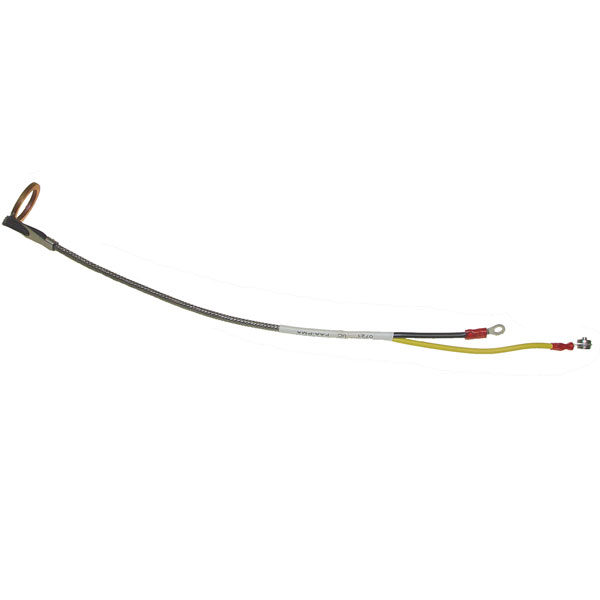Probes
A thermocouple (also called a sensor or probe) is a device formed by the junction between two dissimilar metals, which transforms heat energy into electrical energy. Aviation Exhaust Gas Temperature (EGT)/Turbine Inlet Temperature (TIT) and Cylinder Head Temperature (CHT) systems use thermocouples, lead wires composed of the same two dissimilar metals, and an indicator.
Below is an example of an Exhaust Gas Temperature (EGT) thermocouple.
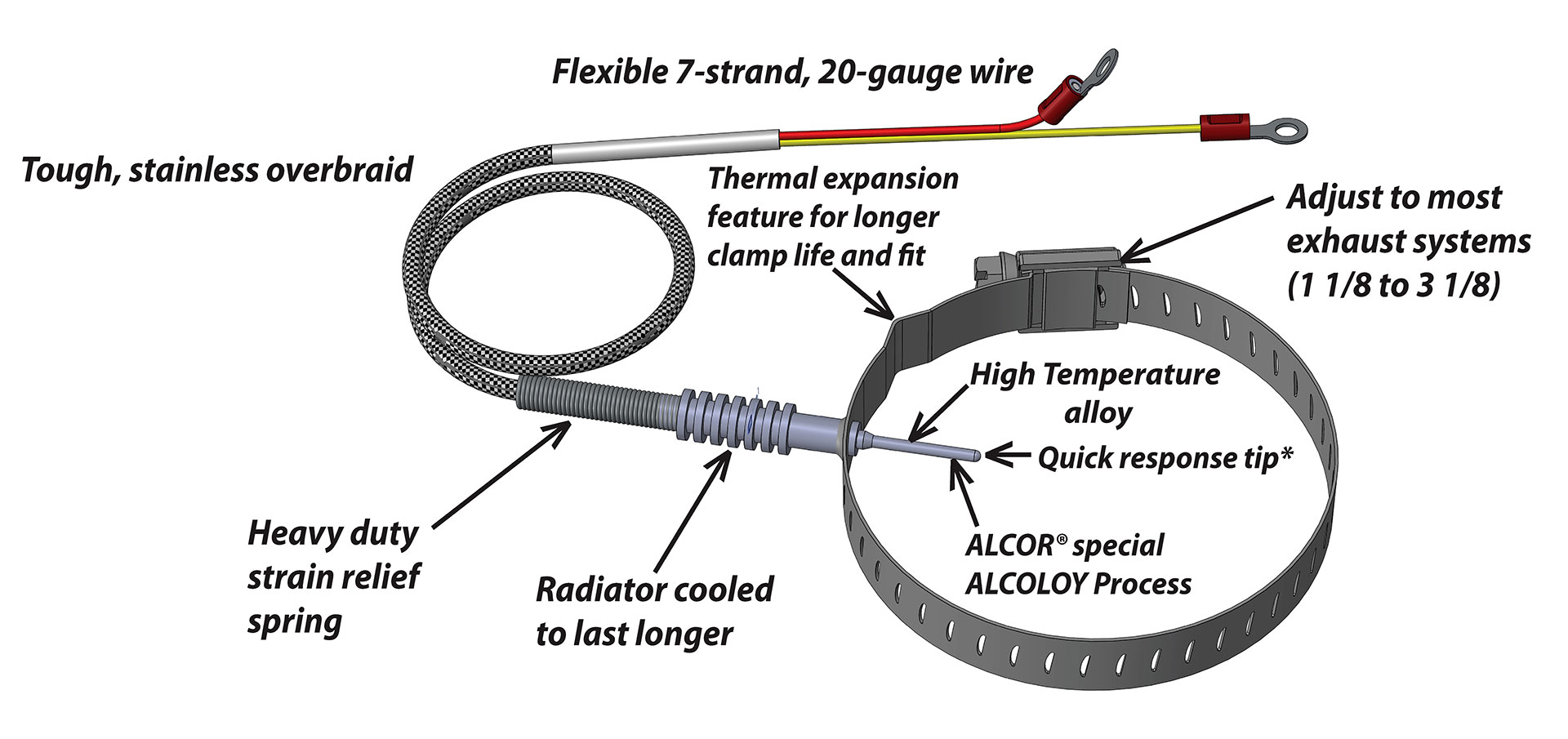

Alcor parts are covered under a blanket STC and PMA, making them legal for installation in any aircraft with a reciprocating engine. Therefore, Alcor products can be used in practically any system of like Type, including digital indicators and Engine Monitoring Systems.
Types of Thermocouples
CHT Type J – Type J sensors are usually identified by yellow (-) and black (+) wires. A small number of manufacturers use red (-) and white (+) or red (-) and black (+), but yellow and black is considered the industry standard. Type J thermocouples are made of iron and constantan metals. Type J thermocouples are more accurate in lower heat range and are used primarily for CHT instruments.
CHT/EGT/TIT Type K – Type K thermocouples are identified by red (-) and yellow (+) wires. Type K thermocouples are made of alumel (red) and chromel (yellow) metals. Type K is the industry standard for EGT/TIT, but some manufacturers spec Type K for use in digital and/or amplified CHT indicators.

EGT Type E – Type E thermocouples are constructed with red (-) and brown (+) wires. Type E thermocouples are made of chromel and constantan metals. Type E thermocouples are of an older technology and produce twice the millivolts of a Type K system.
Important: Type E and Type K components should not be mixed. Choose based on the type of indicator and leads installed in the aircraft.
EGT Type E thermocouples are no longer available. The information contained on this website for Type E thermocouples is for reference only.
Grounded vs Ungrounded Thermocouples

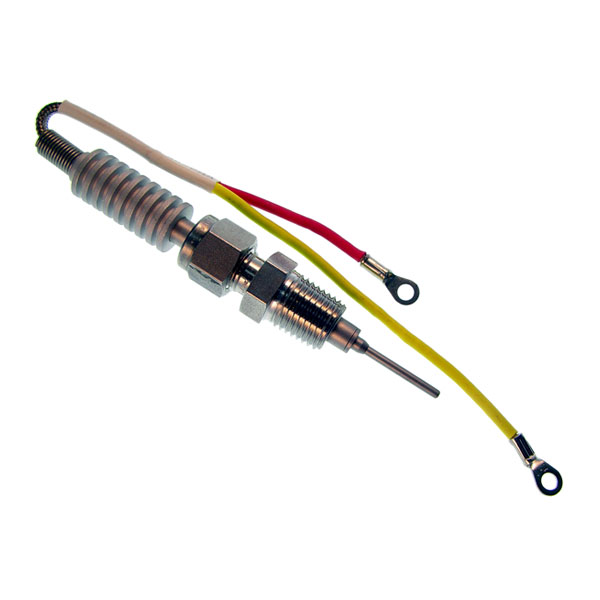
Ungrounded Thermocouples – In an ungrounded thermocouple, wires in the element are welded to each other, but not to the shaft. The thermocouple wire junction is isolated from the rest of the outer sheath and the wires must maintain a certain insulation resistance value to work correctly. This is also referred to as an isolated tip. Therefore, there is no continuity in an ungrounded thermocouple. Alcor offers a one-year warranty on ungrounded thermocouples.
Alcor thermocouples are hand-made in San Antonio, TX and x-rays and tests 100% of thermocouples individually.
Styles of Thermocouples
Clamp Style: Clamp style thermocouples are the most common type of EGT/TIT probe and are available in Type K and Type E. These thermocouples can also be found as grounded and ungrounded options.
Screw-In Style: Screw-in style thermocouples are available for EGT/TIT probes and are available in Type K and Type E. These thermocouples can also be found as grounded and ungrounded options. Alcor screw-in thermocouples are available in 7/16”-20 thread size (common on Continentals) or 1/4” NPT (common on Lycoming’s).
Bayonet Style: Bayonet style thermocouples are available for CHT in Type K and Type J. These style thermocouples twist and lock into a screw-in adapter (28202). Bayonet style thermocouples are most commonly used on engine models equipped with threaded receptor and/or bayonet adapter installed in cylinders.
Gasket Style: Gasket style thermocouples are available for CHT in Type J and no adapter is required. The 18mm adapter fits on all standard aviation spark plugs offered from Tempest and others. Gasket style thermocouples are primarily used on engines not equipped with threaded receptor and/or bayonet adapter in the cylinders.
RTD (Resistance Thermistor Device): An RTD is a different type of sensor that measures resistance, as opposed to millivolts, and acts more like an ohm meter. Alcor manufactures RTD P/N AA86146, which has identical specifications to AN5546-1.
A: Alcor parts are covered under a blanket STC and PMA, making them legal for installation in any aircraft with a reciprocating engine. Therefore, Alcor products can be used in practically any system of like Type, including digital indicators and Engine Monitoring Systems.
Q: What connector terminal hardware does Alcor use on probes/thermocouples?
A: Ring terminals
Q: What is Alcor’s warranty period for probes/thermocouples?
A: Alcor’s grounded probes carry an industry-leading 5-year warranty and ungrounded probes carry a 1-year warranty.
Q: Where can I purchase Alcor probes?
A: Alcor products can be purchased from any authorized Tempest Aero Group distributor or via the Alcor e-commerce shop.
CHT probe screw-in
Q: On a new installation, which cylinder should I install the probe on?
A: Install the probe in the same location as the factory-installed system, or rear cylinder on horizontally opposed engines, or #1 cylinder on radial engines. If unsure, make several similar test flights changing thermocouple locations between flights to select the hottest cylinder. That cylinder should remain the hottest unless airflow is altered because of cooling airflow problems such as air baffling leaks, etc. or cylinder runs excessively lean.
Q: How can I check my probe to see if it is working correctly?
A: Use an Alcor® ALCAL® 2000 EGT/CHT Tester. Otherwise, place the probe in boiling water and either read the Alcor® meter temperature (200° at first mark) or measure millivolt output and compare with table value.
Q: What am I to do if I have replaced the probe/thermocouple and I still do not get an indication on the meter?
A: Inspect entire system for loose connections, broken wires/connectors, or mismatched color-codes between lead/meter and probe and compare with value on meter label. Use cigarette lighter or soldering iron to heat probe and check for reading on meter. Use boiling water for accurate check at first meter mark. If you obtain no indication and lead/probe resistance and type are correct, then you may have a bad calibration potentiometer or damaged meter movement. Call Alcor® for repair.
EGT probe
Q: On a new single probe installation, which cylinder do I install the thermocouple on?
A: This would be the cylinder where the temperature peaks first while leaning. Not all engines, even of the same make and model, will speak the same due to differences in internal airflow characteristics, carburetion, injection, etc. A worst-case scenario would be installing the probe on the richest running cylinder (peaks least) where lean misfire would be reached before peak while leaning.
Q: I installed a new probe, and the meter is still dead or went dead again after being in operation for awhile?
A: First make sure that the correct type of probe was installed by verifying color code matches lead and meter (Type K, Red/Yellow, or Type E, Red/Brown). If that checks all right, then disconnect the lead from the meter and measure the loop resistance of the lead and probe and compare it with the value marked on the meter label. If the value is approximately the same, then the problem is most likely the calibration potentiometer or the movement in the meter. The old probe removed is probably good! Call Alcor® for repair of meter.
Q: Is there any way I can test a thermocouple without expensive equipment?
A: Yes, by using an ALCAL® 2000 EGT/CHT System Tester. If not available then measure the loop resistance of the probe with a digital multi-meter, if available. While viewing display, move probe wire to detect internal wire breaks. If the reading is steady, then the probe is probably good. When heated to just turning red, the temperature is about 1550-1650°F.
Q: What is the best way to troubleshoot my EGT system?
A: Use Alcor’s EGT System Troubleshooting Guide for symptom, possible cause, and solution information.
-
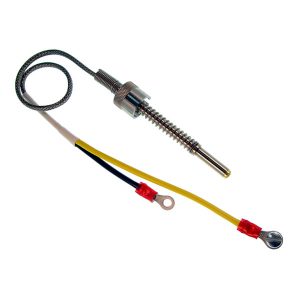
CHT BAYONET STYLE PROBE
P/N: 86251 -
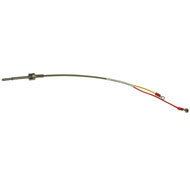
CHT BAYONET STYLE PROBE
P/N: 86252 -

CHT BAYONET STYLE, SCREW-IN PROBE (PREVIOUSLY 86252-3)
P/N: 86253 -
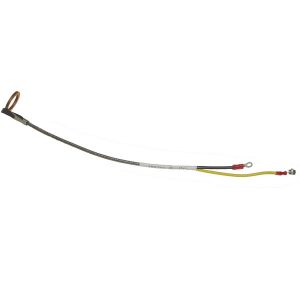
CHT GASKET STYLE PROBE
P/N: 86202 -

CHT REFERENCE THERMOCOUPLE – ALCAL 2000
P/N: 86261 -
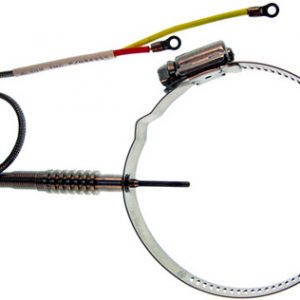
EGT/TIT CLAMP STYLE PROBE
P/N: 86255 -

EGT/TIT CLAMP STYLE PROBE
P/N: 86281 -

EGT/TIT CLAMP STYLE PROBE (ALTERNATE FOR JPI M-111 or MM-111)
P/N: 86226 -

EGT/TIT CLAMP STYLE PROBE (DIRECT REPLACEMENT FOR JPI M-111 or MM-111)
P/N: 86275 -
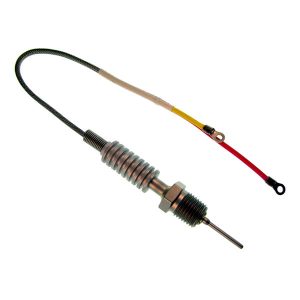
EGT/TIT SCREW-IN STYLE PROBE
P/N: 86159 -
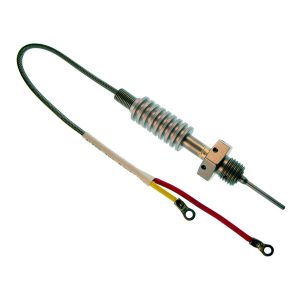
EGT/TIT SCREW-IN STYLE PROBE
P/N: 86160 -
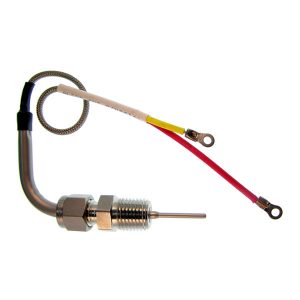
EGT/TIT SCREW-IN STYLE PROBE
P/N: 86161 -
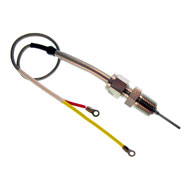
EGT/TIT SCREW-IN STYLE PROBE
P/N: 86230 -

EGT/TIT SCREW-IN STYLE PROBE
P/N: 86240 -
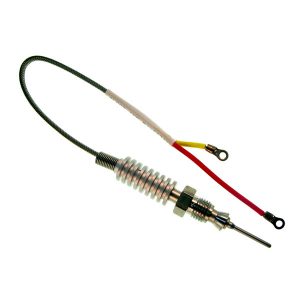
EGT/TIT SCREW-IN STYLE PROBE
P/N: 86245 -
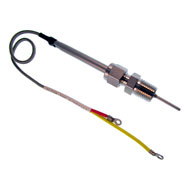
EGT/TITSCREW-IN (1/4 NPT) TYPE K
P/N: 86143 -

PROBE, CHT BAYONET RTD (SUPERSEDES 86146)
P/N: AA86146 -

RTD PROBE, REPLACED BY AA86146
P/N: 86146 -

THERMOCOUPLE; C/A CESSNA
P/N: 86317 -

THERMOCOUPLE: CHT GASKET “K”
P/N: 86268 -

UNGROUNDED EGT/TIT CLAMP STYLE PROBE
P/N: 86310 -
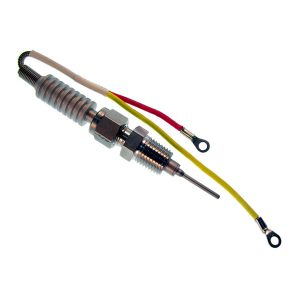
UNGROUNDED EGT/TIT SCREW-IN STYLE PROBE
P/N: 86307 -

UNGROUNDED EGT/TIT SCREW-IN STYLE PROBE
P/N: 86308 -

UNGROUNDED EGT/TIT SCREW-IN STYLE PROBE
P/N: 86309 -

UNGROUNDED EGT/TIT SCREW-IN STYLE PROBE
P/N: 86341


